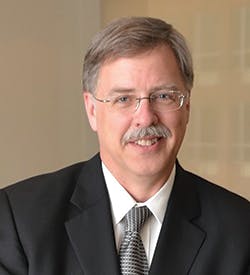In today’s business environment, it’s easier than ever to become irrelevant. New knowledge is being created at such a pace that we can barely keep up, and it’s perpetually expanding. Today’s workers need to keep a finger on the pulse of developments in their fields and constantly update their capabilities. Ongoing professional development, in these ever-changing times, is not merely an option. It’s a necessity for professional survival.
Nelson C. Baker, Dean of Professional Education, Georgia Tech
This need for lifelong learning is reflected in the changing student demographics at public universities. At the Georgia Institute of Technology for example, adults taking professional development courses through Georgia Tech Professional Education constitute 50% of the university’s total student population.
Technological advances are a key driver of change in our workplaces. Engineers and other STEM professionals are particularly in need of career-long education because working with constantly evolving technology is such a central part of their jobs. But they’re not alone. Adults in all fields are starting to see themselves as lifelong learners and accepting the reality that without reskilling and upskilling throughout their careers, they will be left behind.
Longer lifespans also drive the need for lifelong education. Today, people are living longer and need to remain in the workforce longer than previous generations. To continue to deliver value to their employers, older workers need to be ready to embrace new technologies that change the way they do their jobs, which requires sustained retraining and retooling. Currently, 26% of electronics engineers are 55 years old or older, according to 2019 data provided by Emsi. Another 28% are between the ages of 45 and 54, which means that over 50% of electronics engineers are older professionals who aren’t likely to be leaving the workforce soon.
The economy is another factor behind the need for continuing education. The unemployment rate may be low, but job-growth forecasts for some professions aren’t high. For example, employment for electronics engineers is projected to grow by 4% between 2018 and 2028, which is less than the national average of 7%, according to the U.S. Bureau of Labor Statistics. To stand out to potential employers, electronics engineers need to have expertise that other candidates don’t offer.
It’s important to develop skills to meet employers’ current and future needs. Being aware of industry trends and building capabilities to align with them gives professionals the edge they need to compete. For electrical and electronics engineers, as reported by the Bureau of Labor Statistics, the opportunities will come from engineering service firms and research and development rather than from manufacturing, where the growth is slowest. These engineers should plan their learning based on predicted needs of future employers, such as building capabilities to work on projects involving electronic devices and systems.
Professional education needs to be purposeful. As the adult learner population grows, so do the choices for career-long learning options. Georgia Tech, for example, offers 13 master’s degrees, 48 certificate programs and more than 300 courses in STEM, business, and industry-specific subjects to working adults. To add to the complexity, technology is constantly driving new trends and leading to new employer demands. How do busy adults focus their learning to derive the intended benefits?
One way is to tap into a network of mentors or career advisors that we, at Georgia Tech, call a “personal board of directors.” Rather than having an informal mentor to advise professionals on their careers, we envision this “board” to be a more explicit group of individuals from a variety of backgrounds. They will be able to provide guidance on different aspects of a person’s career, such as trends to anticipate, professional education to take, career pathways to consider, among others.
Each member should be selected for a specific reason depending on the individual’s career goals. I’d suggest starting with at least two or three personal “board members” and selecting them to cover three perspectives. At least one member needs to have the disciplinary focus that aligns with the next step in the individual’s career. Board members also need to have a positive, externally focused outlook and be engaged with the chosen field and its influencers. Finally, at least one board member should be able to help the individual overcome self-doubt and provide the encouragement needed to take bold new steps.
Adult learning is on the rise because adults are realizing that lifelong learning is a necessity. Universities are taking note and exploring ways to support this growing learner demographic. Find out how Georgia Tech plans to meet the needs of adult learners.
Nelson C. Baker, Ph.D., is the Dean of Professional Education at the Georgia Institute of Technology and professor in the university’s School of Civil and Environmental Engineering.



